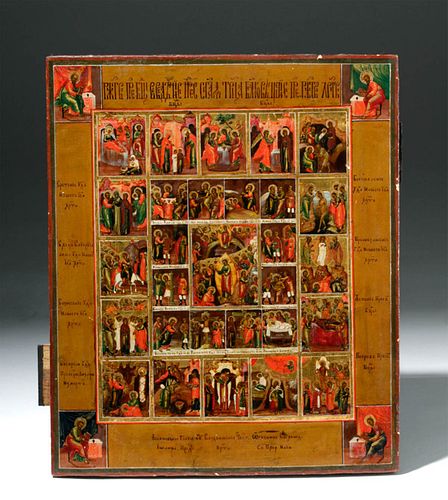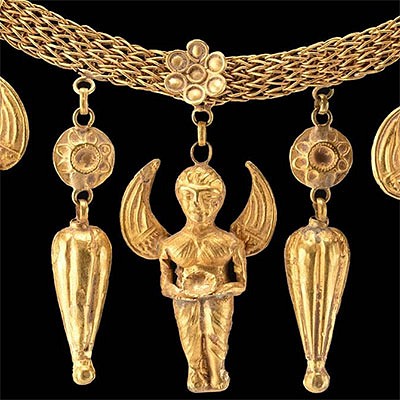Gorgeous 19th C. Russian Icon - Resurrection & Feasts
Lot 136d
About Seller
Artemis Gallery
686 S Taylor Ave, Ste 106
Louisville, CO 80027
United States
Selling antiquities, ancient and ethnographic art online since 1993, Artemis Gallery specializes in Classical Antiquities (Egyptian, Greek, Roman, Near Eastern), Asian, Pre-Columbian, African / Tribal / Oceanographic art. Our extensive inventory includes pottery, stone, metal, wood, glass and textil...Read more
Categories
Estimate:
$8,000 - $12,000
Absentee vs Live bid
Two ways to bid:
- Leave a max absentee bid and the platform will bid on your behalf up to your maximum bid during the live auction.
- Bid live during the auction and your bids will be submitted real-time to the auctioneer.
Bid Increments
| Price | Bid Increment |
|---|---|
| $0 | $25 |
| $300 | $50 |
| $1,000 | $100 |
| $2,000 | $250 |
| $5,000 | $500 |
| $10,000 | $1,000 |
| $20,000 | $2,500 |
| $50,000 | $5,000 |
| $100,000 | $10,000 |
| $200,000 | $20,000 |
About Auction
By Artemis Gallery
Dec 3, 2020
Set Reminder
2020-12-03 10:00:00
2020-12-03 10:00:00
America/New_York
Bidsquare
Bidsquare : Fine Antiquities, Ethnographic & Fine Art
https://www.bidsquare.com/auctions/artemis-gallery/fine-antiquities-ethnographic-fine-art-6119
Features classical antiquities, ancient and ethnographic art from cultures encompassing the globe. Egyptian, Greek, Roman, Etruscan, Near Eastern, Asian, Pre-Columbian, Native American, African / Tribal, Oceanic, Spanish Colonial, Russian, Fine Art, so much more! All legally acquired, legal to sell. Artemis Gallery info@artemisgallery.com
Features classical antiquities, ancient and ethnographic art from cultures encompassing the globe. Egyptian, Greek, Roman, Etruscan, Near Eastern, Asian, Pre-Columbian, Native American, African / Tribal, Oceanic, Spanish Colonial, Russian, Fine Art, so much more! All legally acquired, legal to sell. Artemis Gallery info@artemisgallery.com
- Lot Description
Eastern Europe, Russia, ca. late 19th century CE. A breathtaking festal icon expertly delineated in egg tempera and gold leaf on wood featuring the Resurrection of Christ in the center surrounded by a mandorla and standing atop an empty tomb. The Resurrection is the central theme, the "feast of feasts" celebrated not only on Easter but every Sunday. Surrounding this are 12 scenes depicting the events of Holy Thursday and Holy Friday. These scenes are then surrounded by 16 images of feast days celebrated on the liturgical calendar. In the corners are the four Evangelists (Matthew, Mark, Luke, and John), each one seated in his scriptorium, before a table with an inkwell, holding his Gospel. Size: 10.5" W x 12.25" H (26.7 cm x 31.1 cm), custom stand not included.
The iconography of complex icons like this example that combine festal and paschal scenes was very popular in Russia during the 18th and 19th centuries. Similar to the larger minyeia or calendar icons, festal icons feature a Resurrection image in the center surrounded by 12 scenes of Holy Thursday and Holy Friday, these surrounded by 16 images of feast days celebrated on the liturgical calendar. The only exceptions on this example are two of the outer scenes - Hospitality of Abraham presumably representing the Trinity in the upper middle and the Ascension of Elijah at the bottom; these are not feast days.
Icons were some of the first religious artworks brought to Russia from Byzantium. These sacred pictures reached a high point in the Byzantine era, however, the Russians brought their own style to the art of the icon. Icons were initially created for use in churches and processions. In time they became smaller and were used increasingly within households. To this day they remain an important form of visual culture in Russia's orthodox religious community.
Icons (icon means "image" in Greek) are sacred objects within the Eastern Orthodox Christian tradition. Found in homes as well as churches, these painted images depict holy persons and saints as well as illustrate scenes from the Scriptures. Icons are not worshiped, but are instead venerated for their ability to focus the power of an individual's prayer to God. As such they are truly "windows into heaven."
Provenance: private Francis & Lilly Robicsek Collection, Charlotte, North Carolina, USA, acquired second half of the 20th century
All items legal to buy/sell under U.S. Statute covering cultural patrimony Code 2600, CHAPTER 14, and are guaranteed to be as described or your money back.
A Certificate of Authenticity will accompany all winning bids.
We ship worldwide and handle all shipping in-house for your convenience.
#119446A few minor losses to surface pigment. Area of restoration at lower center with some repainting. Back slats present and accounted for. Overall excellent.Condition
- Shipping Info
-
All shipping is handled in-house for your convenience. Your invoice from Artemis Gallery will include shipping calculation instructions. If in doubt, please inquire BEFORE bidding for estimated shipping costs for individual items.
-
- Buyer's Premium



 EUR
EUR CAD
CAD AUD
AUD GBP
GBP MXN
MXN HKD
HKD CNY
CNY MYR
MYR SEK
SEK SGD
SGD CHF
CHF THB
THB

















